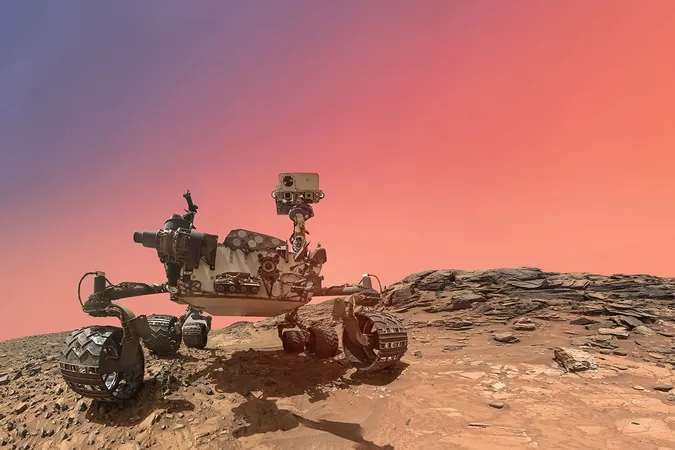
Experience the Sounds of Mars Like Never Before - Thanks to NASA's Groundbreaking Perseverance Rover!
2025-04-05
Author: Sarah
As humanity stands on the brink of exploring Mars, the age-old questions about the Red Planet are becoming increasingly pressing. Can we cultivate food there? Is it possible to generate breathable oxygen? Is there liquid water available? And most intriguingly—what does Mars actually sound like?
The Science of Sound on Mars
Understanding sound on Mars requires an insight into its atmosphere. With an average temperature hovering around a bone-chilling -63°C (-81°F), sound travels through Mars’s thin atmosphere— which has only about 1% of the density of Earth’s— significantly slower and quieter. In fact, sound does not move as swiftly on Mars; it zips through the Martian air at approximately 540 miles per hour, compared to about 760 miles per hour back on Earth.
A striking feature of sound on Mars is its absorption properties. Mars's atmosphere is composed of 96% carbon dioxide, which tends to absorb higher-pitched frequencies, leading to a unique auditory experience. This means that only lower-pitched sounds can be detected over distance, creating a rather eerie silence on the planet.
Capturing the Sounds of a New World
Enter NASA's Perseverance rover, which boasts two advanced microphones designed for sound capture. The rover has successfully recorded various sounds, including the haunting whispers of Martian winds, the whirrs of its mechanical systems, and even the sounds made by the Ingenuity helicopter during its historic flights.
Astrophysicist Sylvestre Maurice from the University of Toulouse, who leads the sound study, refers to this as an entirely new dimension of exploration. “It's a new sense of investigation we’ve never used before on Mars,” he states, underscoring the potential revelations about Mars’s atmosphere and environmental dynamics.
Groundbreaking Discoveries
Perseverance's recordings have provided insights that validate existing theories while steering scientists towards new ones. For instance, the pressure fluctuations caused by turbulence have been documented for the first time, opening up new avenues of exploration.
Interestingly, the sounds captured by Perseverance showed that at times, the atmosphere can be so quiet that scientists momentarily questioned whether the microphone was functioning properly. “Mars is very quiet because of low atmospheric pressure,” notes Baptiste Chide, a co-author of the study. The atmospheric pressure on Mars varies with the seasons, suggesting that the planet could become noisier during certain times of the year.
The Whir of Ingenuity
Among the most captivating sounds captured by Perseverance is that of the Ingenuity helicopter, which made headlines as the first powered aircraft to fly on another planet. Deployed on April 4, 2021, it successfully completed its historic journeys, and Perseverance recorded the low-pitched whir of its rotors. This distinctive sound, measured at 84 hertz, paints a vivid picture of what exploration looks and sounds like on Mars.
This pioneering mission by Perseverance underscores a critical leap in our understanding of not just what it’s like to walk on Mars, but also to hear it. As we develop our strategies for human exploration, these recordings will undoubtedly play an important role in our journey into the cosmos.
Lend your ears to the sounds of another world and get ready to be amazed! Click below to listen to Martian audio, where science fiction becomes science fact.




 Brasil (PT)
Brasil (PT)
 Canada (EN)
Canada (EN)
 Chile (ES)
Chile (ES)
 Česko (CS)
Česko (CS)
 대한민국 (KO)
대한민국 (KO)
 España (ES)
España (ES)
 France (FR)
France (FR)
 Hong Kong (EN)
Hong Kong (EN)
 Italia (IT)
Italia (IT)
 日本 (JA)
日本 (JA)
 Magyarország (HU)
Magyarország (HU)
 Norge (NO)
Norge (NO)
 Polska (PL)
Polska (PL)
 Schweiz (DE)
Schweiz (DE)
 Singapore (EN)
Singapore (EN)
 Sverige (SV)
Sverige (SV)
 Suomi (FI)
Suomi (FI)
 Türkiye (TR)
Türkiye (TR)
 الإمارات العربية المتحدة (AR)
الإمارات العربية المتحدة (AR)